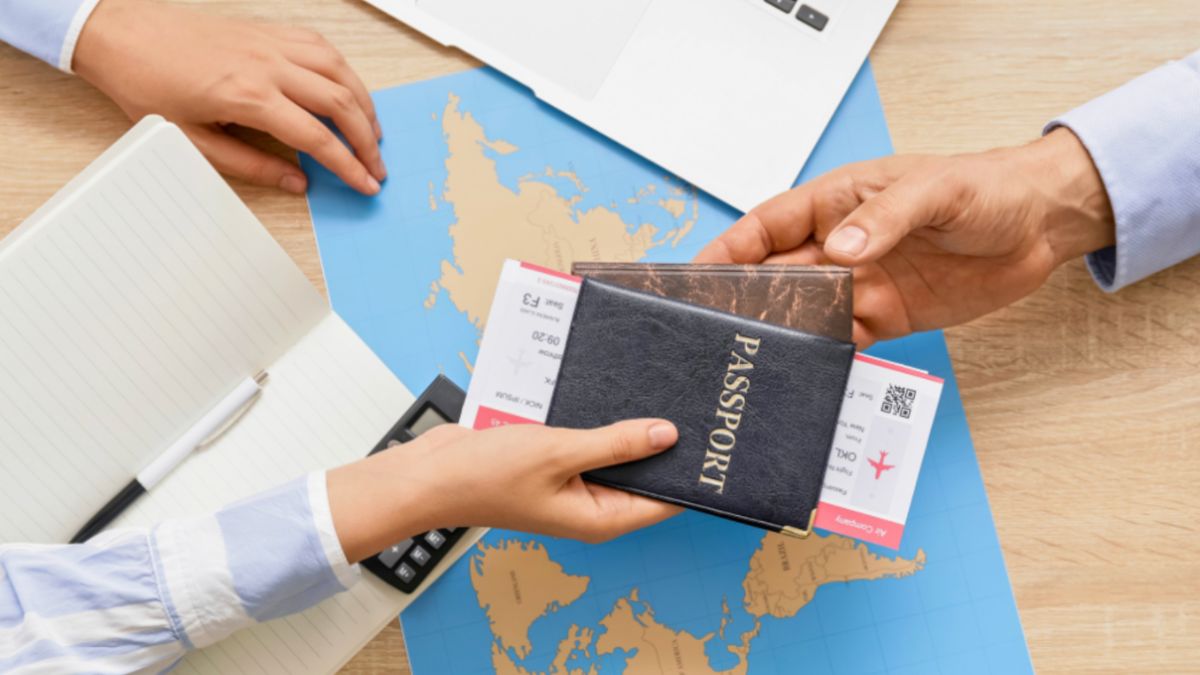Ocean Cruise Planning:
Passports, Visas, and Required Paperwork
Plan Your Ocean Cruise Adventure
Picture this: you’ve spent months saving for your dream vacation, selecting the perfect cruise ship and cabin. You arrive at the port with bags packed and excitement bubbling over. But disaster strikes—you’re turned away at check-in because you don’t have the right documents. Missing paperwork can instantly transform your dream cruise into a costly nightmare.

At Dorian Destinations, we understand that proper documentation is the foundation of successful ocean cruise planning. Our experienced travel professionals help clients navigate the complex world of passport requirements and visa applications, making your cruise dreams come true.
Understanding Passport Requirements for Your Cruise
When it comes to ocean cruise planning, your passport serves as your golden ticket to international waters. Many cruise lines strongly recommend—or may require—a passport book. U.S. citizens on closed-loop cruises (beginning and ending at the same U.S. port) can often re-enter the United States with an original or certified birth certificate and government-issued photo ID, but policies vary by line and destination.
Many countries require six months of validity; the Schengen Area requires at least three months beyond your intended departure. Also note that Schengen requires your passport to have been issued within the previous 10 years on the date you enter. Always check each destination’s current rules. Many travelers check only their departure date, but overlooking validity requirements can lead to denied entry. During ocean cruise planning, confirm your passport’s expiration date well in advance.
First-time cruisers often wonder about passport cards versus passport books. While passport cards can work for land and sea travel to Canada, Mexico, Bermuda, and some Caribbean countries, they are not valid for international air travel. A passport book is the most flexible option for cruises. Most ocean cruise planning professionals recommend passport books for all international travel. If your ship diverts or you must fly home internationally, you will need a passport book to board the flight.
Visa Requirements: When You Need More Than a Passport
Ocean cruise planning becomes more complex when your itinerary includes countries requiring visas. Unlike hotel stays, where you remain in one country, cruises often visit multiple nations on a single trip, each with different entry requirements.
Countries that often require advance visas for cruise passengers include:
- Brazil: Visitor visas for U.S. citizens were reinstated on April 10, 2025; eligible travelers can apply online for an e-Visa.
- China: A tourist visa is usually required, but foreign cruise tour groups of two or more, organized by Chinese travel agencies, may enter visa-free for up to 15 days via cruise ship ports in 13 coastal cities (including Tianjin, Shanghai, Dalian, Xiamen, Qingdao, Guangzhou, Shenzhen, Haikou, Sanya, Beihai, Lianyungang, Wenzhou, and Zhoushan). Confirm eligibility before sailing.
- India: E-Visas are accepted only at designated entry points. For cruise calls, the permitted seaports include Mumbai, Cochin (Kochi), Mormugao (Goa), Chennai, and New Mangalore; verify current port eligibility and your nationality’s e-Visa rules before you sail.
- Egypt: Tourist visas are required; e-Visas are available via the official portal, and a visa on arrival is commonly offered at major airports. Check whether these options apply to your nationality and port of entry before traveling
Your ocean cruise planning should include researching every port of call at least 90 days before departure. Some countries have special provisions for cruise passengers—for example, China permits visa-free entry of up to 15 days for foreign cruise tour groups arriving at designated ports. Always confirm each port’s current rules well before departure.
Children’s Documentation Needs
Traveling with children adds another layer to ocean cruise planning documentation. All children, including newborns, need their own valid passports for international cruise travel. For U.S. citizen children under age 16 on closed-loop cruises returning to the same U.S. port, an original or certified birth certificate is often accepted for U.S. re-entry; travelers age 16 and older generally need photo ID plus proof of citizenship. Always confirm cruise line and foreign port rules.
Special considerations for families include:
- If a minor is traveling without one or both legal parents/guardians, a notarized letter of consent from the absent parent(s), plus any required custody documentation, should be carried. Many countries and some cruise lines mandate this for entry or embarkation.
- Grandparents or other relatives traveling with minors should carry a notarized parental consent letter and, if applicable, copies of custody/guardianship orders.
- Recent name changes require supporting documentation.
Documentation for Different Types of Cruises
Closed-Loop Cruises
Closed-loop cruises depart and return to the same U.S. port. For U.S. re-entry only (under CBP’s WHTI), U.S. citizens on closed-loop itineraries may use an original or certified birth certificate plus government-issued photo ID instead of a passport. Still, some cruise lines and foreign ports require a valid passport, so confirm both cruise-line and destination rules in advance. Because diversions or medical emergencies can require international air travel, a passport book is strongly recommended—you’ll need it to board a flight home. Cruise lines may also set stricter documentation standards.
Open-Jaw Cruises
Open-jaw cruises start in one port and end in another, requiring more careful ocean cruise planning and attention to documentation. These itineraries generally require a passport book, and many cruise lines mandate one—verify the line’s policy and the entry rules of all ports.
Special Circumstances and Documentation
Medical Conditions and Medications

Passengers with medical conditions need additional documentation during ocean cruise planning:
- Prescription letters from doctors for all medications
- Special permits for controlled substances
- Research medication restrictions for each country you’ll visit; keep medicines in original, labeled containers and carry prescriptions and, if applicable, a doctor’s letter.
Name Changes and Documentation
Recent name changes can complicate ocean cruise planning documentation. If your passport shows a different name than your cruise booking, bring marriage certificates, divorce decrees, or court orders showing your name change history.
Getting Your Documents in Order
Passport Processing Times
Standard passport processing typically takes 4–6 weeks, but times may fluctuate based on demand and government backlogs. Begin your cruise planning at least three to four months in advance and check the U.S. Department of State website for the latest processing times.
Processing options include:
- Routine service: 4–6 weeks
- Expedited service: 2–3 weeks (additional fee)
- Urgent travel (within 14 days): appointment at a passport agency/center; availability not guaranteed
- Life-or-death emergency (within three business days): appointment required with proof of qualifying emergency
Visa Application Process
Visa applications vary dramatically by country and typically require:
- Completed application forms
- Passport photos meeting specific requirements
- Proof of travel arrangements
- Financial documentation
- Vaccination proof or health documentation (if required by the destination)
- Interview appointments at consulates
Your ocean cruise planning timeline should account for visa processing times, ranging from days to several months, depending on the destination.
Digital Documentation and Backup Plans
Modern ocean cruise planning should include digital backup strategies. Scan or photograph your passport, visas, driver’s license, and travel insurance documents, storing copies in cloud-based services accessible anywhere.
Backup strategies include:
- Email copies to yourself and trusted family members
- Store physical photocopies separately from originals
- Save insurance policy details and emergency contact numbers
- Use secure cloud storage services
Travel Insurance and Documentation
Travel insurance becomes crucial when dealing with international ocean cruise planning documentation issues. Depending on the policy, travel insurance may provide coverage if visa delays or passport issues cause you to miss your cruise. Compare coverage and exclusions carefully.
Some policies include emergency document replacement services, helping you obtain new passports while traveling. Review these coverage options during your ocean cruise planning process.
Pre-Departure Document Checklist
Create a comprehensive checklist during your ocean cruise planning process:
- Valid passport (check expiration date)
- Required visas for all ports
- Travel insurance documentation
- Prescription medication letters
- Emergency contact information
- Cruise line confirmation documents
- Photo identification backup
- Credit card and banking information
Working with Travel Professionals
Professional travel agents specializing in ocean cruise planning stay current on changing documentation requirements worldwide. They navigate complex visa applications, suggest alternative itineraries if documentation proves problematic, and provide valuable advice based on extensive experience.
Your ocean cruise planning becomes much smoother when working with knowledgeable professionals who understand international travel documentation intricacies.
Frequently Asked Questions
What Documents Do I Need For a Caribbean Cruise?
The documents you need for a Caribbean cruise depend on the itinerary and departure port. U.S. citizens on closed-loop cruises from U.S. ports can often sail with an original or certified birth certificate plus government-issued photo ID, but many cruise lines still recommend or require a passport book. Verify your line’s policy and each port’s rules.
How Far in Advance Should I Apply for Cruise Visas?
How far in advance you should apply for cruise visas depends on your destination, but generally start the visa application process at least 90 days before departure. Some countries require several months for processing.
Can Children Use Birth Certificates Instead of Passports on Cruises?
For most international itineraries, children need passports. On closed-loop cruises from U.S. ports, U.S. citizen minors may be able to sail with a birth certificate (and photo ID if age-eligible). Check your cruise line’s policy and carry a notarized consent letter if a child is traveling without both legal parents.
What Happens if My Passport Expires During My Cruise?
If your passport will expire during or soon after the cruise, renew it before travel to avoid being denied boarding or entry. Entry rules vary, but many countries require at least six months of validity beyond your travel dates.
Detailed Preparation and Documentation Assistance

Proper documentation serves as the foundation of successful ocean cruise planning, transforming potential disasters into smooth sailing adventures. From passport applications to complex visa requirements, every document matters when traveling to international destinations.
At Dorian Destinations, we understand that ocean cruise planning involves much more than choosing a beautiful ship and an exciting itinerary. Our commitment to detailed preparation and documentation assistance has helped countless clients avoid missed cruises due to paperwork problems.
Dorian Destinations
(305) 440-9200


